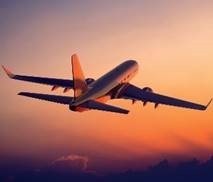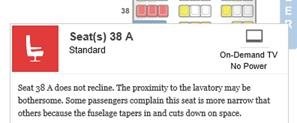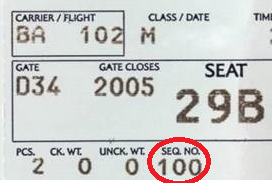Tip o' the Week 387 – Learning to Fly (reprised)
As another spring drifts into the rear-view mirror and a season of travelling looms, the whole rigmarole of getting airborne can be a tiring and unsatisfactory experience, being treated like sheep etc.. (text) Halo 2 had a method for flying (caused by a glitch in the game that was fixed by a later update) but most of us are in the hands of mass air travel to get off the ground. While on life Anyway, here are some thoughts on getting a good seat (maybe even an upgrade) , and having a good flight… Join the frequent flyer program Even if you don’t expect to fly very often on this particular airline, it’s worth signing up to their loyalty program. At least you might be able to specify if you prefer window or aisle seats, and it might help speed you through online checkin and the likes. Put up with the spam you’ll get as a result, and save your userid and password somewhere. Obviously, racking up the points on the program might give you access to airport lounges, pre-flight massages, all you can eat/drink, extra points/miles, the DYKWIA priority queues and all sorts. If you travel a lot, and you’re prepared to commit to one airline, it’s all about attaining & keeping status. Find out what plane you’ll be on
You’ll see the aircraft type (in an abbreviated form – eg. B744 is a Boeing 747-400, A388 is an Airbus A380-800) and as the date & time of the flight gets closer, maybe even the actual aircraft registration that is going to take the flight. Click on that link to see more details of the plane itself, how old it is, where it’s been previously, etc. If you’re a nervous flyer, you might prefer not to know that the plane you’re about to get on made an emergency landing last month and has been with engineering since… If you do a search for the registration number online, you’ll find out all sorts of info about when it was last serviced, how long ago it’s been since the cabin was refitted, etc. Here’s just an example. Pick your seats online before you fly
To see opinions on which is the best seat on your plane, look on www.seatguru.com and/or www.seatexpert.com. Frequent Flyer sites like www.flyertalk.com have endless discussions about which is the best seat on any given configuration of plane (#firstworldproblems if ever you’ve seen them), but are an essential resource if you want to figure out how to get the best out of a frequent flyer or hotel stay program , get tips on how to access lounges or other perks at the airport and lots more. One FT’er flew from London to New York on Concorde by buying lots of biscuits at Tesco, to rack up bonus Clubcard points that got converted into Air Miles. The right place at the right time There is a science behind how airlines decide when to upgrade passengers to a better cabin, and in choosing who to bestow the upgrade upon. Sadly, the science is about as clear as a pint of milk and is likely different for each carrier. Generally speaking, airlines don’t give out upgrades for any reason other than they have to, because they’ve oversold a particular cabin and they have to punt some lucky folk forward into premium economy, business or first class. Unless you’re good friends with someone behind the scenes, the chances of getting upgraded just because you’re smartly dressed and polite are pretty much a thing of the past. Airlines often do “Op-Ups” (or Operational Upgrades ) when they have to, but they also increasingly offer pay-for upgrades at checkin, that can be considerably cheaper than if you’d bought the next class up in the first place. As long as there aren’t enough people happy to take money to go away and come back tomorrow, or to pay to move themselves forwards, there will always be a need to move people around. It’s worth asking at checkin if there are any pay-for upgrade options, and if you’re offered one, it might be a sign that the flight is busy and you could either splash the cash or take the gamble that there could be a freebie on offer. If you’re travelling alone, you’ll have a better chance of getting upgraded – it’s just easier than trying to accommodate several people together. Oh, and don’t order any special catering unless you have to: if an airline goes to the trouble of getting a special gluten free/vegan etc meal for you, they won’t want to push you up into the next cabin where the food served would be different. One way you could put yourself in the frame for an Op-Up is to be on a flight that you know is very busy, probably oversold, at least at the back of the bus. Friday night on BA48 from SEA-LHR at the end of a conference week is a good example – the airline might well sell dozens of economy seats more than they actually have available on the plane, and will either compensate or boot people off the flight if they can’t fill up all the cabins forward of economy by pushing others forward. Most will handle the situation better than in some recent news items. Should you find yourself kicked off an oversold flight, do remember you might be up for some compensation – any EU-based carrier flying to or from an EU member-state airport, for example, is bound by the regulations known as EU261/2004 – in other words, if you flight is cancelled, very late, or if you’re downgraded or offloaded, then the airline is legally bound to give you money by way of compensation – not just free miles or vouchers etc. Know your rights, basically. Have a touch of class When airlines are determining who to push forward (from Economy- to Economy+, from Econ+ to business or even Business to First) , there will be a number of factors that will determine who gets the red carpet treatment – If you really care about finding out how busy your flight is, you could use a site like www.expertflyer.com to interrogate the same systems that travel professionals use, though you will need to pay for the privilege – or just do a trial to see how your next flight looks. See here for some ticket class examples. Basically, if your ticket falls into the lowest of the low classes (group booking, consolidator fares etc) then don’t bother dressing smartly and chatting up the check-in clerk – you aren’t getting an upgrade. You should be able to find your fare code or class by digging around in the T&Cs of your ticket: it’s probably not obvious, although some airlines do print it on their ticket… Points make prizes No Brucie Bonus, but collect enough of the miles or points that you earn by flying and you can sometimes cash them in for flights or upgrades. Sometimes the taxes and other charges are as much as the cost of just buying a regular ticket, so keep your wits about you. With BA at least, the best use of Avios points is what is referred to as “MFU”, or “Miles for Upgrade” – in other words, you buy a ticket in one class and then use points to move yourself forward. MFU seats and Award seats (ie the entirely funded by points) are thin on the ground for some routes and confer a class of travel that itself is non-upgradeable. Check in online as soon as you possibly can
So if you have a seat with a relatively expensive ticket class, you’re a card-carrying (the higher-ranking the better) member of the FF program, and you have a single digit sequence number… then your luck may be in. Try not to look too smug now. |



